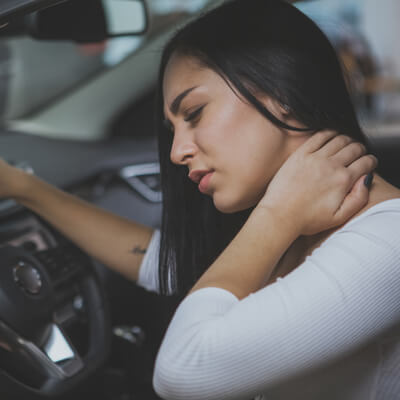Navigating the Auto Accident Process
 Dealing with an auto accident can be overwhelming and scary, leaving many people feeling vulnerable and unsure of what steps to take next. If this is your reality, you don’t have to go it alone. From managing your recovery to handling the complexities of insurance billing, our caring team is here to help you through every step of the process and ensure you get the treatment and support you need.
Dealing with an auto accident can be overwhelming and scary, leaving many people feeling vulnerable and unsure of what steps to take next. If this is your reality, you don’t have to go it alone. From managing your recovery to handling the complexities of insurance billing, our caring team is here to help you through every step of the process and ensure you get the treatment and support you need.
Here’s what you need to know that can help you navigate the auto accident process:
Seek Care Within 14 Days of the Accident
Under Florida’s No-Fault Motor Vehicle Law, drivers are required to carry Personal Injury Protection (PIP) coverage as part of their auto insurance. Typically, No-Fault coverage pays the insured’s bills, regardless of the party’s fault, up to the limit of the insurance. Florida’s No-Fault Motor Vehicle Law requires a treating provider to bill your auto insurance first for any available PIP benefits, even if you did not cause the accident because the other driver was at fault. Your carrier will work with the other party’s insurance company to settle the details later.
Florida state law requires you to seek medical treatment within 14 days of your accident to remain eligible for personal injury protection (PIP) benefits. If you fail to seek medical treatment within 14 days of your accident, you may forfeit your eligibility for PIP benefits. The sooner you initiate care the better your chances of a smoother recovery and coverage process. During your first visit, it’s essential to bring:
- Your auto insurance information, including the name of your carrier, claim number, and adjuster’s contact details;
- A copy of the accident report;
- The at-fault driver’s insurance information, if available; and
- If you have hired an attorney bring their contact information.
PIP Benefits and Emergency Medical Condition (EMC)
In Florida, PIP coverage pays for 80% of your medical bills related to the accident, up to $10,000. However, access to the full $10,000 is only available if you’re diagnosed with an emergency medical condition (EMC), which must be confirmed by a licensed physician (M.D., D.O.), licensed physician assistant (P.A.), licensed dentist, or a registered advanced practice registered nurse (A.P.R.N.). An “emergency medical condition” is a medical condition manifesting itself by acute symptoms of sufficient severity, which may include severe pain, such that the absence of immediate medical attention could reasonably be expected to result in any of the following: serious jeopardy to your health; serious impairment to our bodily functions; or, serious dysfunction of any bodily organ or part.
Without an EMC, you are only eligible for up to $2,500 in PIP medical benefits. PIP can help cover medical expenses such as X-rays, surgeries, physical therapy, chiropractic care, and more, but the treatments must be deemed medically necessary by your insurance provider.
Ongoing Care and Maximum Medical Improvement (MMI)
Until your benefits are exhausted or if your insurance company obtains a differing second opinion from an independent physician of the same discipline, your auto insurance will continue to cover your treatment until you’ve reached Maximum Medical Improvement (MMI) and you have achieved pre-accident status. In some circumstances, PIP benefits may be extended even longer if you have reached Maximum Medical Improvement (MMI) with Partial Permanent Impairment (PPI) and the need for supportive care exists.
Legal Considerations and Payment Options
Many people hesitate to file an auto accident claim due to concerns about rising insurance premiums. However, by law, we are required to use your auto accident insurance if your care is related to the accident.
We’re Here for You—Contact Us Today
If you’ve recently been in an auto accident, don’t wait to start your care. Schedule your initial consultation today and let us help you navigate the path to healing and recovery.

